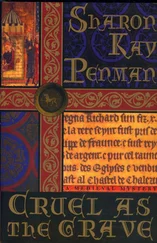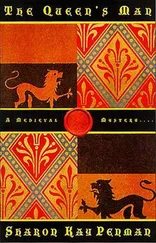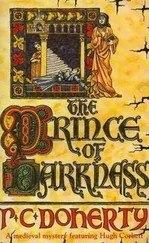Sharon Penman - Prince of Darkness
Здесь есть возможность читать онлайн «Sharon Penman - Prince of Darkness» весь текст электронной книги совершенно бесплатно (целиком полную версию без сокращений). В некоторых случаях можно слушать аудио, скачать через торрент в формате fb2 и присутствует краткое содержание. Жанр: Исторический детектив, на английском языке. Описание произведения, (предисловие) а так же отзывы посетителей доступны на портале библиотеки ЛибКат.
- Название:Prince of Darkness
- Автор:
- Жанр:
- Год:неизвестен
- ISBN:нет данных
- Рейтинг книги:5 / 5. Голосов: 1
-
Избранное:Добавить в избранное
- Отзывы:
-
Ваша оценка:
- 100
- 1
- 2
- 3
- 4
- 5
Prince of Darkness: краткое содержание, описание и аннотация
Предлагаем к чтению аннотацию, описание, краткое содержание или предисловие (зависит от того, что написал сам автор книги «Prince of Darkness»). Если вы не нашли необходимую информацию о книге — напишите в комментариях, мы постараемся отыскать её.
Prince of Darkness — читать онлайн бесплатно полную книгу (весь текст) целиком
Ниже представлен текст книги, разбитый по страницам. Система сохранения места последней прочитанной страницы, позволяет с удобством читать онлайн бесплатно книгу «Prince of Darkness», без необходимости каждый раз заново искать на чём Вы остановились. Поставьте закладку, и сможете в любой момент перейти на страницу, на которой закончили чтение.
Интервал:
Закладка:
Sharon Kay Penman
Prince of Darkness
PROLOGUE
December 1193
ST-MALO, BRITTANY
They came together on a damp December evening in a pirate’s den. That was how she would one day describe this night to her son, Constance decided. The men of St-Malo were legendary as sea wolves, prideful and bold, and so were the men gathered in this drafty, unheated chapter house. Torches flared from wall sconces, casting smoky shadows upon the cold stone walls, upon their intent, expectant faces. Several of them already knew what she would say; the “unholy trinity,” as she liked to call them, three of the duchy’s most powerful lords, knew. So did their host, an affable gambler with a corsair’s nerve and a bishop’s miter. As for the others, they’d embraced the aim, needed only to be apprised of the means.
Turning toward the man hovering by the door, Constance beckoned him forward. He came slowly, as if reluctant to leave the shadows, and it occurred to her that she’d rarely seen him in the full light of day. Although a man of God, he had the polished manners of a courtier, and he bent over her hand, murmuring “My lady duchess,” as if offering a benediction.
Constance did not like him very much, this unctuous instrument of her enemy’s doom, and she withdrew her fingers as soon as his lips grazed her skin. She felt no gratitude; he’d been very well paid, after all. In truth, she found herself scorning him for the very betrayal that would serve her son so well. Loyalty was the currency of kingship, and he’d already proven that he dealt in counterfeit.
“This is Robert, a canon from St Etienne’s Cathedral in Toulouse.” She did not introduce the lords or Bishop Pierre. When she nodded, Robert produced a parchment sheet. All eyes were upon him as he unrolled it and carefully removed the silk seal-bags, revealing plaited cords and tags impressed with green wax, coated with varnish. Savoring the suspense, Constance held the letter out to the closest of her barons, Andre de Vitre.
Andre was already familiar with the letter, but he made a show of reading it as if for the first time. Rising from his seat in a gesture of respect for Raoul de Fougeres’s years and stature, he passed the letter to the older man. Raoul read without comment, offered it to Alain de Dinan. One by one, they read the letter, studying those dangling wax seals with the exaggerated care due a holy relic. Only after the letter had made a circuit of the chapter-house and was once more in Constance’s hands did the questions begin to flow. Did Her Grace believe the seals were genuine? Who else knew of this letter? And how had it come into the possession of Canon Robert?
“Does it truly matter?” she challenged. “This letter is evidence of a foul crime, a mortal sin. Once its contents become known, it will give the Holy Church a potent weapon to use against the ungodly heresies that have taken root in Toulouse. And it will be of great interest to the king of the French and to the Lionheart.”
Richard Coeur de Lion. England’s charismatic crusader-king, celebrated throughout Christendom for his courage, his bravura deeds on the bloody battlefields of the Holy Land, his mastery of the arts of war. But in Constance’s mouth, the admiring sobriquet became a sardonic epithet, for her loathing of her Angevin in-laws burned to the very bone.
“This letter will draw as much blood as any dagger thrust,” she said, “and I will not pretend that does not give me pleasure. But there is far more at stake than past wrongs and unhealed grievances.” She paused, and for the first time that night, they saw her smile. “With this, we shall make my son England’s king.”
CHAPTER 1
December 1193
GENETS, NORMANDY
Apallid winter sun had broken through the clouds shrouding the harbor, although the sea remained the color of slate. Brother Andrev’s mantle billowed behind him like a sail as he strode toward the water’s edge, but he was as indifferent to the wind’s bite as he was to the damp, invasive cold. No true Breton was daunted by foul weather; Brother Andrev liked to joke that storms were their birthright and squalls their meat and drink.
As always, his gaze was drawn to the shimmering silhouette of Mont St Michel. Crowned by clouds and besieged by foam-crested waves, the abbey isle seemed to be floating above the choppy surface of the bay, more illusion than reality, Eden before the Fall. During low tide, pilgrims would trudge out onto those wet sands, intent upon saying prayers and making offerings to Blessed St Michael. The prudent ones hired local men to guide them through the quicksand bogs, men who would be able to get them safely to the rocky citadel before the tides came roaring back into the bay. When warned of the fearsome speed of those surging waters, people sometimes scoffed, refusing to believe that even a horse at full gallop could not outrun that incoming tide. The bodies that washed up on the beaches of the bay would be given decent Christian burial by the monks of Mont St Michel; for those swept out to sea and not recovered, only prayers could be said.
In the three years since Brother Andrev had been assigned to the abbey’s cell at Genets, not a day passed when he’d not blessed his good fortune at being able to serve both God and St Michael. This December noon was no different, and as he filled his eyes with the majesty of the motherhouse, his soul rejoiced in a deep and profound sense of peace.
“Father Andrev!” A towheaded youngster was running toward him, skimming over the beach as nimbly as a sandpiper. Recognizing the son of Eustace the shipwright, Brother Andrev waved back. He no longer corrected them when they called him “Father” instead of “Brother,” for he understood their confusion. Brother Andrev was that rarity, both ordained priest and Benedictine monk, and thus more intimately involved with the daily lives of the villagers than his monastic brethren, saying Mass, hearing their confessions, baptizing their babies, and burying their dead.
“Where are you off to in such a hurry, Eudo? I’ve rarely seen you move so fast… unless you were on your way to dinner, of course.”
The boy grinned. “I was fleeing from Brother Bernard,” he said cheekily. “He caught Giles and me throwing dice in the churchyard and I bolted, not wanting to hear another of his sermons about our slothful, sinful ways.”
Brother Andrev knew he ought to pick up the gauntlet flung down by Brother Bernard and lecture Eudo about the evils of gambling, especially on the Lord’s Day. But he liked to play hasard and raffle himself, and he did not count hypocrisy among his sins. Too often he’d wanted to flee, too, when Brother Bernard launched into one of his interminable homilies.
Before he could respond, Eudo’s head came up sharply. “Oh, crud! I cannot believe he’s tracked me this far-” With that, he spun around and began to sprint up the beach, leaving Brother Andrev to gape after him in puzzlement-until he turned and saw the stout figure in Benedictine black bearing down upon him.
“Was that Eudo?” Brother Bernard was panting, his normally florid complexion now beet-red with annoyance and exertion. But when Brother Andrev would have offered up a defense of the errant youngster, the other monk waved it aside impatiently; whatever had brought him onto the windswept beach, it was not Eudo’s tomfoolery. “I have been looking for you everywhere, Brother Andre. I should have known you’d be here,” he said, churlishly enough to give his words an accusatory edge.
At first Brother Andrev had done his best to master his dislike of Brother Bernard. He was no saint, though, and his good intentions had frayed under constant exposure to the other monk’s surly disposition and sour outlook upon life. “Ahn-DRAY-oh,” he said coolly, “not Andre. It is a Breton name, not a French one. You’d like it not if I called you Bernez instead of Bernard.”
Читать дальшеИнтервал:
Закладка:
Похожие книги на «Prince of Darkness»
Представляем Вашему вниманию похожие книги на «Prince of Darkness» списком для выбора. Мы отобрали схожую по названию и смыслу литературу в надежде предоставить читателям больше вариантов отыскать новые, интересные, ещё непрочитанные произведения.
Обсуждение, отзывы о книге «Prince of Darkness» и просто собственные мнения читателей. Оставьте ваши комментарии, напишите, что Вы думаете о произведении, его смысле или главных героях. Укажите что конкретно понравилось, а что нет, и почему Вы так считаете.












